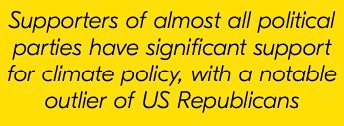Banking on the Future
Two things you can do to protect the people and places you love.
Recapping last week’s issue.
Every one needs-to-know:
Fossil-fuel pollution is having a devastating impact on our planet and communities around the world including ours.
The vast majority of people want immediate and increased government action on climate.
Supporters of urgent climate action outnumber opponents 8 to 1.
A majority of people see solving climate change as a generational moral responsibility.
Most climate policies are welcomed by more than 65% of all people no matter what political party they vote for.
While nearly everyone is worried about the growing impacts of fossil-fuel pollution, we don’t talk about it with friends and family. The 23-country survey I mentioned last week found that most Americans “rarely” or “never” discuss global warming with family and friends.
That said, even in countries like the U.S., and to a lesser extent Canada, Australia, and Norway, where climate change has been politicized, a majority of people want immediate action on climate, and see it as a moral responsibility to protect the people and places we love.
Two things you can do today.
1. Talk about ways we can ensure a better future for our kids and protect nature
Perhaps the most important thing we can do is talk with family, friends, neighbors, and co-workers about climate solutions—ways to reduce fossil-fuel pollution. Here’s a topic you could bring up for example:
Clean energy like solar and wind, brings affordable reliable, and sustainable electricity to everyone’s daily lives.
Cleaner energy targets accelerate the movement to cleaner air and water, and a healthier environment for everyone. These targets have helped clean energy power about 35% of the world’s electricity.
Solar and wind are now the cheapest bulk power sources in 91 percent of the world, and the UN’s International Energy Agency (IEA) expects renewables to generate 90 percent of all new power in the coming years. The energy revolution has happened. Sorry if you missed it.
—Renowned energy expert Amory Lovins, 2022
If we want safer, healthier communities with reduced smog, then it makes sense to subsidize clean technologies to help them get started. After all, fossil-fuel polluters have been subsidized for decades.
2. Change where you bank.
Need-to-Know: Most big banks use our deposits to fund carbon polluters
Here’s a shocking new analysis about banks’ role in carbon pollution.
If your bank lends to carbon-intensive industries, just $1,000 in your account could produce as much carbon pollution as a flight from New York City to Seattle.
Banks can invest our deposits in either carbon-intensive or climate-friendly enterprises. Most of the largest in the U.S. and Canada invest between 19% to 30% of deposits (our money) in carbon-intensive industries, according to Project Drawdown.
Need-to-Know: Switching banks can be a powerful, relatively easy, and affordable climate action.
Bank Green is a volunteer group that evaluates banks in different countries. It can tell you how your bank is doing based on its investment ratio of clean energy vs. fossil fuel financing. For example, if the bank’s investment in clean energy is 80% or higher than those in fossil energy, it is rated OK.
Sadly, my soon-to-be-former bank, TD Bank, is rated as #1 in the world for tar sands financing. TD is rated WORST. More about TD Bank here.
The site can also suggest greener alternatives you might want to switch to. And if your bank isn’t there, you can ask Bank Green to check it out.
Need-to-Know: What you do matters.
Where you can, it’s important to reduce the carbon pollution we have control over such as how we bank or travel, and what we buy, eat, and do. This also matters because what we do influences others. For example, if we ask for vegetarian meals in restaurants, others will too, and restaurants will offer more veggie options. Same with biking or installing solar panels or a heat pump.
What you do matters. You have the power to participate in shaping the future. It’s up to you to find your focus and community; it’s up to all of us to do what we can to choose the best and avoid the worst future coming at us.
— Rebecca Solnit in What Can I Do about the Climate Emergency?
I hope you found this helpful.
Until next time, be safe.
Stephen
P.S. See also my related post Later is too Late to act on Climate




